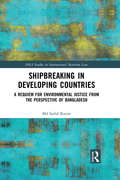- Table View
- List View
Shifting: The Double Lives of Black Women in America
by Kumea Shorter-Gooden Ms. Charisse JonesCommemorating its 20th year in print with a new Introduction and updated content, Shifting explores the many identities Black women must adopt in various spaces to succeed in America. Based on the African American Women's Voices Project, Shifting reveals that a large number of Black women feel pressure to compromise their true selves as they navigate America's racial and gender bigotry. Black women "shift" by altering the expectations they have for themselves or their outer appearance. They modify their speech. They shift "white" as they head to work in the morning and "Black" as they come back home each night. They shift inward, internalizing the searing pain of the negative stereotypes that they encounter daily. And sometimes they shift by fighting back. In commemoration of its twentieth year in print with a new Introduction and updated content throughout Shifting is a much-needed, clear, and comprehensive portrait of the reality of Black women's lives today.
Shine Brighter: Choosing a Life of Greater Clarity, Purpose, and Joy
by Fred DodiniFind direction in your life with this clear pathway to help committed people achieve their highest and brightest potential.In an increasingly lonely, chaotic, and darkening world, more people are struggling to find direction in their lives and to achieve greater connection and cohesion in their relationships. As many people see the social and political connections between people deteriorate, they are also discovering that the bonds that hold marriages and families together are weakening too. In the face of these mounting challenges, good people everywhere need an axiom that unites them and a plan of action for achieving the best outcomes for themselves, their families, and their communities. Shine Brighter shares a simple yet essential truth about human beings’ purpose and destiny. Throughout these pages, Fred Dodini explains how the sun, the moon, and the stars provide models to assist individuals in making the most important decision of their lives.
Shining a Light: Creating Pathways to Equity, Safety, Healing, and Justice With People with Disabilities
by Shirley PaceleyShining A Light is a powerful personal and professional memoir of one woman’s journey in partnership with other people with disabilities to find equity, safety, healing, and justice. Shining A Light confronts the oft-hidden issue of sexual assault against people with disabilities, including its alarming prevalence and insightful stories of resilience and hope. Chapters on education, trauma and recovery, criminal justice, and systems change Illuminate how service professionals can create authentic and healing relationships with survivors with disabilities and transform systems of service, healing, and justice. <P><P> Shining A Light clearly demonstrates the fact that sexual assault occurs within a context of power differences, and the reader gets to learn from the experts - people with disabilities. The lives of people with disabilities are illuminated through poignant stories of inequality and violence as well as stories of profound connections, speaking truth to power, and the capacity of dreams to change lives. <P><P> The reader discovers that as the author partners with others to heal from their trauma, she is on a parallel path to heal from her own. This epic book contains lessons learned and critical tips along with resources for survivors, family members, disability services, victim services, criminal justice personnel, counselors, sexual assault nurses, and others.
Ship Building, Sale and Finance (Maritime and Transport Law Library)
by Baris Soyer Andrew TettenbornWritten by a team of acclaimed practitioners and leading academics, this book brings together in one single volume an analysis of contemporary legal issues concerning ship building, sale and finance contracts. It offers a comprehensive, expert and thoroughly practical guide on what is a very complex area of law in today's international shipping industry. The book presents a detailed and critical analysis of standard and non-standard shipbuilding and sale contracts, including vital but often overlooked issues such as payment and refund guarantees, which have been at the forefront of recent litigation and practice. It also critically and thoroughly analyses several types of standard insurance contracts, including shipbuilder's risks and mortgagee's interests, which are not adequately dealt with elsewhere and it provides a critical and contemporary discussion on the legal and practical issues surrounding ship finance, ship mortgages and more esoteric issues such as the use of bareboat charters and financial derivatives. This book is an indispensable guide for legal practitioners, academics and industry professionals worldwide. The book is divided into 3 parts; Legal Issues relating to Ship Building, Ship Sale Contracts and Practice, and Legal and Practical Issues relating to Ship Finance. Each has been expertly contributed to by the leading practitioners and academics in the field from top firms, chambers and institutions including; Ince & Co, Quadrant Chambers, Haynes and Boone CDG, LLP, Holman Fenwick Willan LLP, Watson Farley & Williams LLP, 7 Kings Bench Walk, and Institute of International Shipping and Trade Law (IISTL) of Swansea University.
Ship Operations: New Risks, Liabilities and Technologies in the Maritime Sector (Maritime and Transport Law Library)
by Andrew Tettenborn Bariş SoyerThis book covers in one handy volume all the major topics associated with ship operations. Carefully, co-ordinated to ensure breadth, relevance and lack of overlap, the topics covered are addressed by authors are the very top of their profession, whether in legal practice or academia, and are presented in a manner which is topical and clear. Part I offers a detailed and critical analysis of issues of contemporary importance concerning new liability regimes and developments. Part 2 discusses how parties, in particular ship operators, attempt in contemporary practice to allocate their risks concerning ship operations. Part 3 evaluates the legal position of those involved in more ‘back office’ operations. The book provides an invaluable guide to recent legal and practical developments and offers a comprehensive, well-informed and thoroughly practical guide on what is a very complex and developing area of law. It will therefore be of great use to legal practitioners and administrators of ship operations worldwide, as well as students in this area and academics associated with maritime law generally.
Ship Registration: Law And Practice (Lloyd's Shipping Law Library)
by Richard Coles Edward WattShip Registration Law and Practice is fully updated and now entering its third edition. Part of Lloyd’s Shipping Law Library, it is the most authoritative guide to the theory and practice of ship registration in the most popular jurisdictions. It contains the reference material needed to submit a vessel for registration at the leading ship registries world-wide, as well as extracts from key international conventions in this area, a new statistical analysis of the world merchant fleet and Port State control rankings.
Ship Sale and Purchase (Lloyd's Shipping Law Library)
by Paul Turner Iain Goldrein Matt HannafordShip Sale and Purchase is the essential working guide for anyone involved in the business of making ship sale and purchase agreements and also in the resolution of disputes arising out of such agreements. The seventh edition of Ship Sale and Purchase contains a detailed clause-by-clause analysis of SHIPSALE 22, the new standard form Memorandum of Agreement for ship sales and purchases published by BIMCO in 2022. This clause-by-clause analysis is supplemented by commentary on the corresponding provisions of the other leading standard forms used in the global shipping markets - SALEFORM 2012 (the latest version of the longstanding standard form produced by the Norwegian Shipbrokers' Association), SINGAPORE SHIP SALE FORM 2011 and NIPPONSALE 1999 - and the main differences between these forms and SHIPSALE 22. This edition of Ship Sale and Purchase also contains a comprehensive description of the many ways in which standard form agreements may be modified, through amendments to the printed terms and the use of additional clauses, to suit the particular requirements of the parties to individual transactions. In addition, it analyses relevant decisions of the English courts and arbitration tribunals and explains the implications of these decisions for ship sale and purchase transactions. The seventh edition also includes commentary on changes in working practices such as the use of electronic signatures, the practice of "remote" closings, payment mechanisms and the impact of sanctions and anti-corruption legislation. As with previous editions, the seventh edition of Ship Sale and Purchase seeks to provide legal analysis, market insight and practical guidance for all those involved in the business of buying and selling second-hand ships.
Ship Sale and Purchase: First Supplement To The Second Edition (Lloyd's Shipping Law Library)
by Paul Turner Iain Goldrein Matt HannafordShip Sale and Purchase is an essential working guide for anyone involved in the business of making ship sale contracts and also in the resolution of related disputes. It continues to be of great practical use, highlighting typical problems and tensions between the parties to ship sale contracts, as well as best practice. This sixth edition contains a clause-by-clause commentary on SALEFORM 2012, the latest edition of the highly successful Memorandum of Agreement for the Sale and Purchase of Ships, issued by BIMCO and the Norwegian Shipbrokers Association. Key differences with the previous SALEFORM are described in order to help all involved get up to speed. Recent case law is evaluated to highlight contractual issues that have arisen in recent years and a comprehensive description of the many ways in which the standard form provisions may be modified to suit the particular requirements of each transaction. It provides complete coverage on the subject by including a practical overview of two other ship sale contracts, the current (1999) edition of Nipponsale and the first edition (2011) of the Singapore Ship Sale Form.
Shipboard Management
by Simon DanielsShipboard Management supports students undertaking qualification at all stages of maritime training, enhancing and developing knowledge and understanding of the key issues in the Merchant Shipping (Training and Certification) Regulations 1997, as subsequently amended by the 2015 Regulations and other legislation.Informed by real-world experience of commercial shipboard operations, Shipboard Management offers an essential study guide addressing the issues which are most frequently confronted in the context of ship management. It is designed to foster the ability to analyse and apply the dynamics of the legal and operational structures in which the shipboard management team must engage in merchant vessel operations. Students will progress through increasingly difficult levels of learning activity in order to develop problem-solving abilities. The text focuses on the application of skills and techniques that are fundamental to commercial shipping and that meet the demands of the Merchant Shipping (Standards of Training, Certification and Watchkeeping) Regulations.This will be essential reading for all students and candidates on MCA-accredited Deck training courses, and for seafarers wishing to apply for Certificates of Equivalent Competency. It is also a key reference for professionals in ship-owning and management companies, and for maritime lawyers.
Shipbreaking in Developing Countries: A Requiem for Environmental Justice from the Perspective of Bangladesh (IMLI Studies in International Maritime Law)
by Md Saiful KarimThis book explores the process of shipbreaking in developing countries, with a particular focus on Bangladesh. In the past, shipbreaking (the disposal of obsolete ships) was a very common industrial activity in many developed countries. However, due to stringent domestic environmental and labour laws it is almost impossible for the increasing number of vessels to be disposed of domestically, and now developing nations including Bangladesh, China, India, Turkey and Pakistan regularly participate in this activity. The shipbreaking yards in these countries are not only detrimental to the marine and coastal environment but also represent significant health hazards to local people and workers. Given the global importance of the issue, an effective legal and institutional framework for a sustainable operation of the shipbreaking industry is desperately needed. Sitting at the intersection of three distinct fields – environmental justice, international environmental law and international maritime law – this book offers an innovative take on the issues surrounding the shipbreaking process. Drawing on the case study of Bangladesh due to its prominence in the shipbreaking industry, the author implements an environmental justice framework to examine the issues of sustainability surrounding shipbreaking, and analyses the relationship between social development, economic development and environmental protection. Maritime perspectives of environmental justice will also be highlighted through a discussion of the International Maritime Organization’s role in the implementation of the Hong Kong Convention in developing countries. This book will be of great interest to scholars of environmental justice, international maritime law and international environmental law.
Shipbrokers and the Law
by Andrew JamiesonThis text provides an explanation of the responsibilities and liabilities of the shipbroker, both in direct contact with principles and as part of a chain of other brokers. Highlighting legal questions arising from ways in which the broker's business is done, issues addressed in this book include potential legal liabilities as well as common negligence claims. The book also deals with the shipbroker's entitlement to commission and the problems associated with litigation in this area. It is suitable for ship owners, charterers, agents and marine consultants, as well as brokers.
Shipbroking and Chartering Practice (Lloyd's Practical Shipping Guides)
by Evi Plomaritou Anthony PapadopoulosNow in its eighth edition, this classic text is a first point of reference for anyone looking to obtain an understanding of chartering and shipbroking practice. It provides hands-on, commercially-focused explanations of chartering business and invaluable advice on how the shipping market operates across a broad range of topics. The authors also deal expertly with the legal, financial, operational and managerial aspects of chartering, offering numerous case studies which clearly link theory to practice. This new edition has been fully revised and updated to reflect the current trends in chartering practice, legal developments and standard forms of charterparties. New to this edition: Enriched with practical examples covering crucial aspects of chartering and shipbroking business, such as voyage estimations, freight conversions and tanker calculations. New material on day-to-day laytime principles, including "Laytime Definitions for Charterparties 2013", associated commentary and relevant examples. Shipping Marketing as a modern tool of improving chartering and shipbroking business. Expanded coverage of the economic background of chartering, including markets, vessels, cargoes, trades and fixtures. Freight rates for all vessel types from 1980 to 2015. Updated review of well-known standard charterparty documents (including NYPE 2015), together with clauses and wordings commonly applying to various charter types. Analytical glossary containing typical terms and abbreviations used in chartering negotiations. This book is an essential guide for practitioners in private practice and in-house for shipowners and cargo houses, as well as those studying shipbroking and chartering.
Shipping Law
by Simon BaughenIn this well-established textbook, Simon Baughen expertly covers the whole spectrum of English shipping law, placing the highly specialised rules of shipping in a commercial context and relating them to the general principles of contract and tort law. The book's accessible narrative and useful glossary of key terms will particularly benefit students new to Shipping Law or from non-law backgrounds. In-depth commentary on judicial decisions and well-balanced coverage and analysis of recent and key cases, such as The New Flamenco, The Ocean Victory, and The Kos, provide an up-to-date reference for all students on Shipping Law courses. The comprehensive overview of topics also ensures that the book is ably suited to course use, including discussion of such areas as: Bills of lading Charterparties Salvage Marine Pollution Arbitration Accidents and collisions Fully updated throughout, this sixth edition provides an invaluable source of reference and will be of use to both students and to those in practice.
Shipping Law
by Simon BaughenIn this well-established textbook, Simon Baughen expertly covers the whole spectrum of English shipping law, placing the highly specialised rules of shipping in a commercial context and relating them to the general principles of contract and tort law. The book’s accessible narrative and useful glossary of key terms will especially benefit students new to shipping law or from non-law backgrounds. In-depth commentary on judicial decisions and well-balanced coverage and analysis of recent and key cases, such as The Longchamp , Spar Shipping v Grand China Logistics , The Maersk Tangier , provide an up-to-date reference for all students on Shipping Law courses. The comprehensive overview of topics also ensures that the book is ably suited to course use, including discussion of such areas as: Bills of lading Charterparties Salvage Marine Pollution Jurisdiction Choice of Law Arbitration Accidents and collisions Fully updated throughout, this seventh edition provides an invaluable source of reference and will be of use to both students and to those in practice.
Shipping Law
by Simon BaughenIn this indispensable textbook, Simon Baughen expertly covers the whole spectrum of English shipping law, placing the highly specialised rules of shipping in a commercial context and relating them to the general principles of contract and tort law. The 8th edition is brought fully up to date, covering all the relevant legal implications following on from Brexit. In-depth commentary on judicial decisions and well-balanced coverage and analysis of recent and key cases provide an up-to-date reference for students on shipping law courses. All key topics are comprehensively covered, including bills of lading, charterparties, salvage, marine pollution, jurisdiction, choice of law, arbitration, and accidents and collisions. Continuing significant and noteworthy developments in shipping law are explored in this new edition, such as the introduction into the House of Lords in October 2022 of the Electronic Trade Documents Bill. The field of international conventions has also seen several changes since the previous edition. Shipping Law provides an invaluable source of reference, both for students and those in practice. The book’s accessible narrative and useful glossary of key terms will especially benefit students new to shipping law or from non-law backgrounds.
Shipping Law Handbook
by Michael BundockAnyone who deals with shipping disputes requires access to a mass of source materials. These include international conventions, statutes and statutory instruments, arbitration rules, and the most commonly encountered bills of lading, charterparties, insurance clauses, guarantees and other contracts. Details of the parties to the international conventions are also required. The Shipping Law Handbook collects all this material in one convenient and easy-to-use volume. <P><P>The Handbook deals with the following areas: <li>arrest, jurisdiction and applicable law; <li>arbitration; <li>limitation of liability; <li>cargo claims; <li>collision; <li>marine insurance; <li>oil pollution; <li>salvage, toward and general average; <li>standard forms. <P><P>Each section has an introduction which gives a brief overview of the materials included, setting them in their context, and noting probably future developments. <P><P>The Handbook has been fully revised for this sixth edition. New items include: the European Judgments Regulation (Recast) 2012, the LMAA Terms 2017, the Insurance Act 2015, the York-Antwerp Rules 2016, the Inter-Club Agreement 1996 (amended 2011), Barecon 2017, Congenbill 2016, NYPE 2015 and updated lists of parties to international conventions. <P><P>The Handbook is a highly practical work, which anyone involved in shipping will wish to keep conveniently to hand. It is an essential reference work for shipping lawyers, arbitrators, P&I Clubs and their correspondents, shipowners, ship masters, agents and brokers.
Shipping Performance Management (Lloyd's Practical Shipping Guides)
by Photis M. PanayidesIn the dynamic and volatile shipping industry, effective performance management is essential to an organization’s success. This book is a practical guide to developing a holistic and comprehensive performance measurement and management system at managerial level in shipping organisations. Companies in the shipping industry must perform well across many facets of the organization to satisfy an array of demands and obligations arising from a complex environment of customers, partners, competitors and regulators. This book shows how companies can develop systems to effectively gauge and monitor organizational performance, including among others strategic, economic, environmental, social and operational performance. Topics covered include: tools and approaches for measuring performance; strategy and the use of the Balanced Scorecard; the mapping of shipping business strategy; the development of KPIs; cascation; and implementation. This guide to performance measurement and management is an important resource for managers in the shipping and maritime transport industry, as well as those aspiring to hone their skills in the art of performance management and decision-making.
Shipping and the Environment: Law and Practice (Lloyd's Shipping Law Library)
by Colin De La Rue Charles B Anderson Jonathan HareFrom the time it was first published in 1998, Shipping and the Environment has been the leading text on international and US law and practice in this field. Written by renowned legal and insurance practitioners with over 100 years of combined specialist experience, including first-hand knowledge of many major incidents, it is not only a comprehensive reference work but an abundant source of introductory material and practical insights, all explained with a clarity appreciated by lawyers and non-lawyers alike in a broad international readership. While updating its core subjects of pollution from ships, wreck removal and dumping at sea, this enlarged text extends into other modern areas including pollution from offshore operations after Deepwater Horizon, plastics released into the sea, recycling of vessels, polar operations, and the fast-changing restrictions on carbon emissions from ships, as well as safety threats such as cyberattacks, terrorism and modern forms of piracy. With a highly readable introductory chapter amounting to a book within a book, this is a volume of great importance to all whose work or studies are concerned with marine environmental affairs, whether in government, international bodies, industry, technical organizations, the professions, environmental NGOs, the academic world or other walks of life.
Ship’s Officer’s Guide to Port State Control: Responsibilities and Procedures (Synthesis Lectures on Ocean Systems Engineering)
by Alexander Arnfinn Olsen Fidaa KarkoriThis book is a comprehensive guide to Port State Control (PSC) responsibilities and procedures, offering invaluable insights for maritime professionals. Through this book, readers will learn the intricacies of PSC inspections, contraventions, and detentions, as well as discharge requirements under MARPOL.The chapters cover topics such as the Port State Control regime, conduct of PSC officers, detention of vessels, and detailed inspections for vessel structural and equipment requirements. The authors provide an expert analysis of investigations and inspections under MARPOL Annexes I and II, control of operational requirements, and certification of seafarers. Particular attention is given to the ISM Code and PSC procedures related to LRIT.This essential resource is designed for engineers, maritime professionals, and students in merchant ship operations, maritime law, and port procedures. It offers a clear and unambiguous structure central to safety in safety-critical industries. Whether you are an academic or a practitioner in the field, this book will enhance your understanding of PSC responsibilities and procedures.
Shi’i Jurisprudence and Constitution
by Amirhassan BoozariFocusing substantially on the relation between the concept of constitutionalism and Islamic Law in general and how such relation is specifically reflected in the Shiite jurisprudence, this volume explores the juristic origins of constitutionalism, especially in the context of 1905 Constitutional Revolution in Iran.
Shooting Hipsters: Rethinking Dissent in the Age of PR
by Christiana SpensIn an age of PR, public protest and other forms of dissent have lost their meaning and impact. The intense media interest in rioting and political violence, as well as an existing obsession with youth culture, have led to an over-saturation and misrepresentation of what these movements are about. Political protest has become a pantomime where activists are always villains, and therefore the politics of these groups are routinely ignored. By identifying the ways in which publicity has helped and hindered a wide range of movements, Shooting Hipsters will find out the ways in which dissenting groups can thrive and survive in a media-saturated age, as well as describing the common ways that they can be undermined.
Shooting Straight: Telling the Truth About Guns in America
by Wayne Lapierre James J. BakerOpposed to gun control.
Shooting at Loons (Deborah Knott #3)
by Margaret MaronWe follow Judge Deborah Knott to the state's lush Crystal Coast, where expensive yachts ride at anchor...and murders wash in on the "Down East" tide. Asked to sit in for a hospitalized judge in gracious old Beaufort, Deborah hopes to spend a restful week at her cousin's nearby Harkers Island cottage; but her very first clamming expedition turns up the corpse of a well-known fisherman in the shallow waters. Discovering the body puts her right in the middle of the fight between the locals who have long made their living from the sea and the new tide of well-to-do "dingbatters": weekenders and land developers who view the coast as their personal playground and gold mine. Deborah soon realizes that the centuries-old way of life in this isolated corner of the South is as endangered as loons and sea turtles, and the fisherman's murder is clearly tied to the coming changes. On the bench and off, she can feel the rage and fear and greed these changes arouse. Even so, sipping her bourbon in the fresh salt air proves beneficial for Deborah's soul, and life at the beach takes a definite upswing when she meets a game warden who's hunting for loon poachers. Not until a second murder occurs and a lover from her past becomes a suspect does Deborah realize she's up to her own neck in intrigue - and dangerously close to a killer...
Shopping and Crime (Crime Prevention and Security Management)
by Joshua A. N. Bamfield<p>For many people ‘going shopping’ is seen as one of life’s great pleasures. It combines the excitement of a bargain, the thrill of the chase, new experiences, three-dimensional mental arithmetic, disappointments, successes, the pleasures of varied interactions with other people, the chance to renew old acquaintances, manual labour and, often, exhaustion. It is thought to be heavily gendered, with males being more utilitarian, focusing only on buying particular items (or refusing to engage in shopping), and females being as interested in the processes and often more wide-ranging in the product categories they will buy on a shopping expedition (Woodruffe, 1997; Miller, 2008). <p>t the same time, retailing is also a major crime scene, with retailers being the most targeted victims of crime. There are many times more crimes against retailers than domestic burglaries, robberies or car crime. The total stolen is also higher. Retailers in the United Kingdom lost goods and cash costing £3,664 million ($5.9 billion) to retail crime in 2010 (Bamfield, 2010a) and according to a sample survey by the British Retail Consortium (BRC) caught almost one-half million people stealing from them (BRC, 2011a). In the United States the total stolen was estimated to be as high as $32.6 billion.</p>
Shortlisted: Women in the Shadows of the Supreme Court
by Renee Knake Jefferson Hannah Brenner JohnsonWinner, Next Generation Indie Book Awards - Women's NonfictionBest Book of 2020, National Law JournalThe inspiring and previously untold history of the women considered—but not selected—for the US Supreme CourtIn 1981, Sandra Day O’Connor became the first female justice on the United States Supreme Court after centuries of male appointments, a watershed moment in the long struggle for gender equality. Yet few know about the remarkable women considered in the decades before her triumph.Shortlisted tells the overlooked stories of nine extraordinary women—a cohort large enough to seat the entire Supreme Court—who appeared on presidential lists dating back to the 1930s. Florence Allen, the first female judge on the highest court in Ohio, was named repeatedly in those early years. Eight more followed, including Amalya Kearse, a federal appellate judge who was the first African American woman viewed as a potential Supreme Court nominee. Award-winning scholars Renee Knake Jefferson and Hannah Brenner Johnson cleverly weave together long-forgotten materials from presidential libraries and private archives to reveal the professional and personal lives of these accomplished women.In addition to filling a notable historical gap, the book exposes the tragedy of the shortlist. Listing and bypassing qualified female candidates creates a false appearance of diversity that preserves the status quo, a fate all too familiar for women, especially minorities. Shortlisted offers a roadmap to combat enduring bias and discrimination. It is a must-read for those seeking positions of power as well as for the powerful who select them in the legal profession and beyond.
























